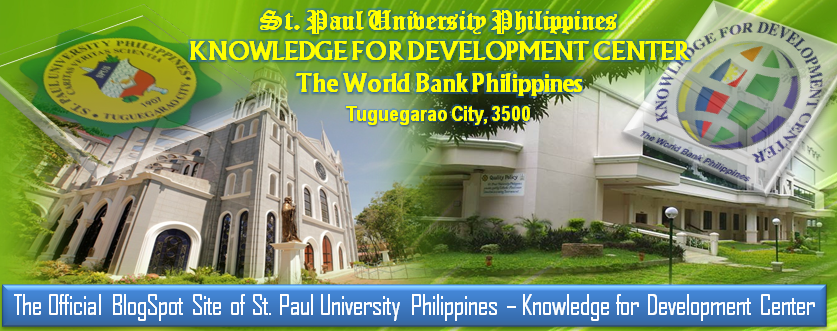“If
you have the hand to work, the heart to understand, and the head to think –
everybody will go to heaven”, Hon. Mayor Atty. Nicanor De Leon reflected as he
delivered his inspirational message to the one hundred thirty nine (139) participants
which composed of Barangay Officials, CSOs, NGOs, and local constituents of the
thirty seven (37) barangays of Amulung, Cagayan to the seminar-workshop
entitled “Training on Community Participation in Procurement” with the theme “Improving the Quality and Responsiveness of
Public Spending in Poor Communities through Localized Procurement Reform”
at St. Paul University Philippines, Tuguegarao City last February 24-26, 2014. This second phase of engagement was implemented by St. Paul University Philippines – Knowledge
for Development Center (SPUP-KDC) in partnership with Transparency and
Accountability Network (TAN) and Government Procurement Policy Board-Technical
Support Office (GPPB-TSO) supported by the Japan Social Development Program
through the World Bank (WB). The
training joined by the live-in participants aimed to a) promote the adoption of
transparent and participatory procurement mechanisms for the delivery of
poverty reduction programs in at least disadvantaged municipalities in the
Philippines; b) institutionalize public procurements processes in poor
communities; c) localize procurement reform at the municipal level; and d)
appreciate local project management. “Indeed, a blind man cannot lead another
blind man”, Mayor De Leon added as he expressed his gratefulness to the training
coordinators and organizers particularly the TAN and its linkages for guiding
his compatriots in serving their own municipality better through the
application of the knowledge and skills will be acquired from this endeavor.
“With this
training, Amulungeños will surely be empowered most specifically in implementing
barangay development projects to uplift the constituents’ economic status”, Dr.
Antonio Talamayan, Vice-President for Academics, articulated as he welcomed
the guests and participants. The
participants were acknowledged as the Municipal Budget Officer of Amulung, Ms.
Judith Dela Cruz introduced them. For
the audience to have a glimpse on the objectives of the three-day fruitful
training, Dr. Rosalinda Tanguilan, the Local Project Coordinator of the said
activity increased the level of their expectations by staging a video
presentation of the same training held last August 2013.
Dr. Jesus Pizarro, the first
resource speaker, discussed the principles of Social Accountability (SAc). The importance and value of SAc within the
context of good governance, tools and approaches, commitment to SAc, action
plans to address current problems, and building partnerships were highlighted
by Dr. Pizarro.
Meanwhile,
a Department of Budget Management representative, Mr. Rey Villon, discussed the
general provisions and revisions of the Government
Procurement Reform Act (GPRA). The
Republic Act No. 9184 is an act providing for the modernization,
standardization and regulation of the procurement activities of the government
and for other purposes.
The participants shared their
insights and lessons learned from the previous topics as the second day
started. Ms. Jo-Anne Galiza and Mr.
Alejo Cambri Jr. shared the topics on Community Participation on Procurement
Manual (CPPM). Ms. Galiza expounded the
essence of camaraderie on 53.12 through team building activities while Mr.
Cambri elucidated the legal references, key aspects and guiding principles to
community participation.
To provide the participants with
understanding on the roles of the different committees such as PPMC, PPC, MIC
and CRFC, Mrs. Judith Dela Cruz stressed the steps to be undertaken by the
barangay in preparation for the community procurement and the basic requirements
needed for the community to participate as a contractor or service provider. A workshop on it was transpired to
experience actual practices in
their own community.
The participants from the thirty
seven (37) barangays were grouped into eight. Their talents and skills in
acting were forced to display as each group was tasked to portray the actual
processes of community participation in procurement based from the actual
development priorities of their respective locality.
A parallel session for Resource
Mobilization and CSO Observer’s Guide to Public Procurement were conducted by
Mr. Allen Cambri and Mrs. Dela Cruz
respectively. The former was attended by
the Barangay Officials to increase their awareness in possible ways they can
mobilize resources for procurement activities while the latter was attended by
the CSOs and NGOs to internalize their responsibilities, rights and
accountabilities in 53.12.
Meanwhile, Mr. Ronaldo P. Sumait, the Knowledge for Development Center Librarian/Knowledge Facilitator, served as a Process Documenter of this engaging activity. The comments and suggestions of the participants will be very vital in the revision and finalization of the Community Participation in Procurement Manual produced by the (GPPB-TSO).
The participants shared their reactions, comments and suggestions on 53.12. They are hopeful that this training will strengthen their community participation in procurement leading to proper implementation of upcoming development projects. The training ended with the distribution of certificates to the resource speakers and participants.












